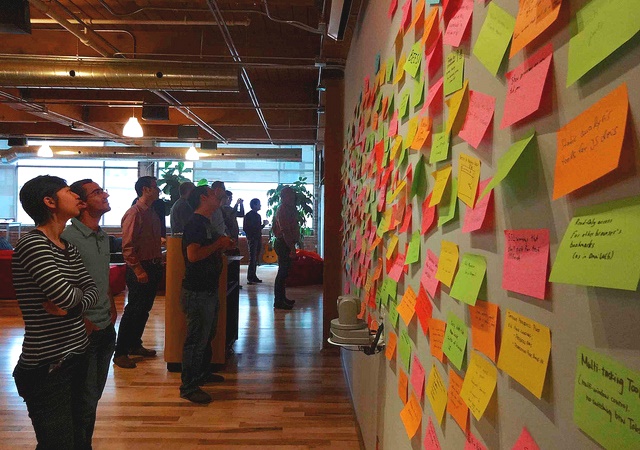Reclaiming democracy: A systems approach to change the system
Oliver Escobar writes that despite the increasing emphasis on deliberative democracy, scholars are only just starting to formulate a perspective that accommodates and values various meanings and practices of democracy as part of a coherent deliberative system. He therefore welcomes the systemic approach articulated by Simon Burrall in Involve’s new report ‘Room for a View’ as a valuable and timely contribution to the discussion.

Credit: Jennifer Morrow CC BY 2.0
There is a long way for ‘democracy’ to mean more than ‘representative democracy’, and for politics to mean more than ‘party politics’. But many in UK civil society, academia and policy-making are undertaking the job of reclaiming democracy and politics as everyone’s business. For them, the word ‘democracy’ should evoke a vibrant ecology of practices, with participation and deliberation as engines, from kitchen tables to streets and churches, from community hubs to council chambers, from public squares to parliamentary benches.
In this context, various adjectives are appended to ‘democracy’ (e.g. participatory, deliberative, direct) to reflect a range of democratic perspectives, aspirations and innovations. The ‘deliberative turn’ has become prominent as it emphasises informed talk amongst a diversity of viewpoints as the basis for making policies and decisions, solving problems and improving public services. Only recently, however, have deliberative scholars made a substantial effort to think systemically (e.g. Parkinson and Mansbridge 2013) and offer a perspective that accommodates and values various meanings and practices of democracy as part of a coherent deliberative system.
A systems perspective allows to see the contribution that non-deliberative practices make to deliberative democracy. For example, the role of campaigning or boycotting in order to include new issues and voices in mainstream policy agendas. By the same token, it also throws into relief the shortcomings of deliberative spaces that are not participative and exclude citizens (i.e. elite-driven committees). Most importantly, deliberative systems thinking recasts our eye onto the political ecologies that make up our democracies. This rebalances the current focus on developing a repertoire of participation toolkits, online platforms, facilitation techniques and forum designs, and redirects attention to how it all hangs together as part of a democratic system. Otherwise, the peril of focusing on toolkits and techniques is the resulting piecemeal approaches that risk the commodification of participation and deliberation –an ‘add on’ to democracy that can be bought off the shelf (on the risks of the ‘participation industry’ see Caroline W. Lee’s ‘Do-it-yourself-democracy’).
In Involves’ new publication ‘Room for a View’ Simon Burall articulates a systemic approach that reflects the latest thinking in deliberative democracy, digesting scholarly work and turning it into overarching ideas to guide new practice. The think-piece should contribute to inform work and debates amongst democratic innovators and reformers, practitioners, scholars and citizens. This couldn’t be timelier, as competing meanings and practices of democracy gain centre stage in current debates about democratic reform in the UK.
—
This blog was written in response to the launch of the report Room for a View by Involve’s director Simon Burall. Read the full report and follow Involve on Twitter. It represents the views of the author and not those of Democratic Audit UK, or the LSE. Please read our comments policy before posting.
—
 Oliver Escobar is Lecturer in Public Policy at the University of Edinburgh, Co-Director of What Works Scotland and convener of the Citizen Participation Network at the Academy of Government.
Oliver Escobar is Lecturer in Public Policy at the University of Edinburgh, Co-Director of What Works Scotland and convener of the Citizen Participation Network at the Academy of Government.





 Democratic Audit's core funding is provided by the Joseph Rowntree Charitable Trust. Additional funding is provided by the London School of Economics.
Democratic Audit's core funding is provided by the Joseph Rowntree Charitable Trust. Additional funding is provided by the London School of Economics.
[…] Oliver Escobar, Lecturer in Public Policy, University of Edinburgh […]
Reclaiming democracy: A systems approach to change the system https://t.co/zH6EoYK7sR
Reclaiming democracy: A systems approach to change the system https://t.co/llwTTIYpbS
Reclaiming #democracy: A systems approach to change the system, by @OliverEscobar in response to @InvolveUK report https://t.co/RXPdPQ2WgT
Power to thecpeople?
https://t.co/Cli1diXfei
via @democraticaudit @InvolveUK
@democraticaudit @involveuk @oliverescobar ❤🇬🇧#NHS
❤🇬🇧#HEROES
❤🇬🇧#FREEDOM
❤🇬🇧#Democracy
❤🇬🇧#VoteLABOUR
❤🇬🇧https://t.co/pfSsVdwG3k
[…] Oliver Escobar writes that despite the increasing emphasis on deliberative democracy, scholars are only just starting to formulate a perspective that accommodates and values various meanings and pr… […]
‘Democracy’ should evoke a vibrant ecology of practices, with participation and deliberation as engines – https://t.co/EfOxExcYa7
Reclaiming democracy: A systems approach to change the system https://t.co/IOGkHTz4uh
RT @InvolveUK: “Reclaiming democracy: A systems approach to change the system” @OliverEscobar on Room for a View https://t.co/mOLa64JHe2 @…
[…] new report, Room for a View, by our director Simon Burall. We’ve cross posted the blog from the Democratic Audit site […]
“Reclaiming democracy: A systems approach to change the system” @OliverEscobar on Room for a View https://t.co/mOLa64JHe2 @democraticaudit
Reclaiming democracy: A systems approach to change the system https://t.co/tT9uZWSH1k
Reclaiming democracy: A systems approach to change the system https://t.co/0iFHCrJggN
Retweeted RGICS (@RGICS):
Reclaiming democracy: A systems approach to change the system https://t.co/AihhkLs2vB https://t.co/ath4jOVUVp
Reclaiming democracy: A systems approach to change the system https://t.co/1EydRXPPTs
Reclaiming democracy: A systems approach to change the system https://t.co/y63PzSAx4E https://t.co/zJAsqfdObB